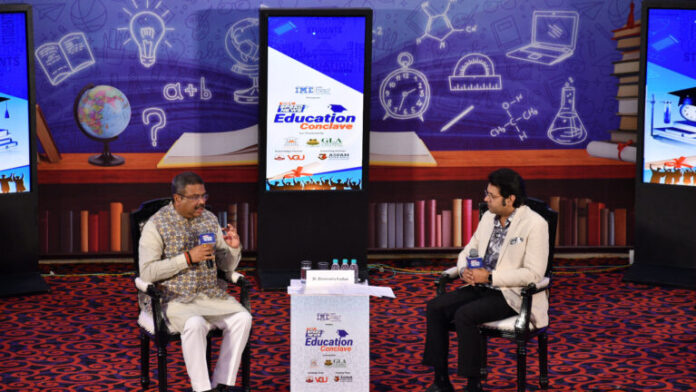New Delhi, 27th February 2025: Union Education Minister Dharmendra Pradhan addressed the India TV Education Conclave at the Scope Convention Centre, New Delhi, emphasizing that NEP 2020 promotes multilingual education while preserving India’s linguistic and cultural heritage. He clarified that the policy does not impose any language but instead encourages learning in mother tongues to enhance comprehension and cognitive development.
Multilingual Learning and Global Opportunities
Shri Pradhan stressed that India’s diverse linguistic landscape is a strength, not a barrier. The NEP framework ensures equal importance for all Indian languages while integrating global best practices. Dismissing concerns about language imposition, he said, “By not implementing NEP, we are depriving students, teachers, and parents of global opportunities.”
Five Years of NEP: Progress and Reforms
Reflecting on five years of NEP implementation, the minister acknowledged COVID-19 challenges but highlighted the government’s efforts to build a strong educational foundation. He pointed out that early education lacked an institutional structure before NEP. Now, with the introduction of Bal Vatika, early childhood education focuses on holistic development, skill-based learning, and interest-driven education.
Board Exam Reforms to Reduce Stress
The minister also addressed the upcoming Class 10 board examination reform, scheduled for 2026, which will allow students to appear twice a year. He stated that this initiative aligns with NEP’s goal to reduce exam-related stress while improving learning outcomes. “This reform is widely supported, with nearly 99% of people in favor. It will make exams a tool for learning rather than pressure,” he said. The CBSE draft guidelines are open for public feedback before final implementation.
AI and Digital Literacy in Education
Shri Pradhan emphasized the role of artificial intelligence (AI) and digital skills in modern education. Integrating AI-driven learning will help students adapt to future job markets and enhance their problem-solving abilities. “The government is committed to a balanced approach, ensuring students gain both hands-on skills and digital proficiency,” he noted.
Key Discussions at the Conclave
The India TV Education Conclave featured discussions with policymakers, university leaders, EdTech experts, and education professionals. The key topics included:
- The impact of NEP 2020 on future generations
- The increasing number of Indian students studying abroad
- The evolving role of coaching institutes in mainstream education
The event reinforced the need for collaborative efforts to build an inclusive, skill-driven, and globally competitive education system. Stakeholders agreed that India’s youth must be equipped with 21st-century skills to thrive in a rapidly changing world.











